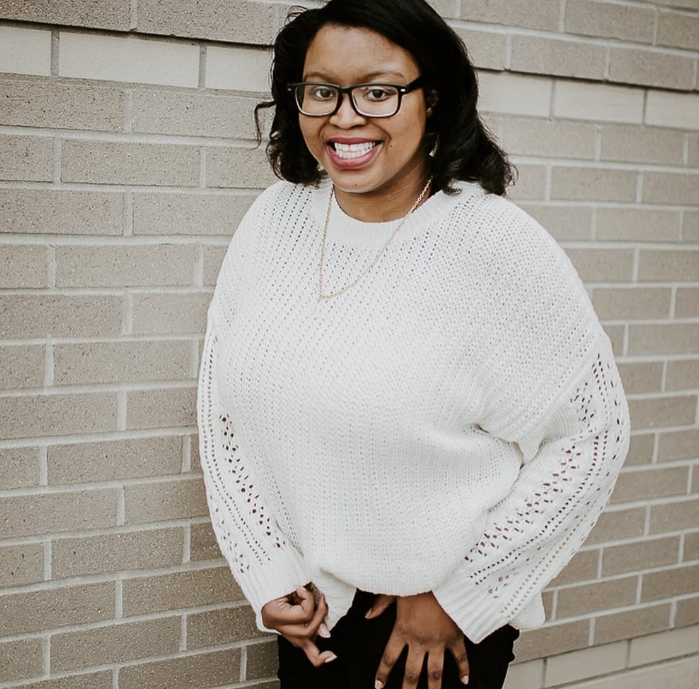
Why We Are Gardening
Socialization, good health and more reasons to garden with Easterseals

The American Horticulture Therapy Association might say they’re strengthening memory, social skills, coordination and language, but Julie Smrha says the adults in the day program at Easter Seals Capper Foundation in Topeka, Kansas, are blissfully unaware of all that. By gardening at the center, they're simply having fun.
“With the perennials, our adult clients are able to feel and plant the bulbs, care for them, then see them grow. They not only plant, but they also clean up, so responsibility is taught throughout the whole growing process too,” says Julie, the Marketing Manager for the Capper Foundation.
Gardening has been so well-received at Capper, they’re updating a courtyard area that was once a playground to augment their garden. The people who attend the center talk to each other about what to plant next, and so far this year they’ve planted zucchini, oregano and cotton. “Cotton is a hearty plant that grows well in sunshine,” says Julie. “It has nice foliage in the spring, colorful blooms in early summer and by late summer cotton bursts from each plant!”
To make gardening more accessible, local businesses are helping to develop a hardscape, a hard surface with raised stone areas in which to plant, which allow wheelchairs to roll up to the beds to care for, and to enjoy, the flowers and plants.
It Sure Is Growing!

Central and Southeast Ohio garden
Capper isn’t the only Easterseals affiliate offering gardening. At Easter Seals Central and Southeast Ohio, people have gotten scrappy and made use of any open patches of land to grow their own “salsa garden” with onions, peppers and tomatoes. And, yes, they do make salsa and use the food they grow for lunch and snacks, encouraging healthy eating.
Also at Central and Southeast Ohio, they’ve used a strip of land along the side of the building to grow a starter garden for the kids in their summer and early intervention programs. The small garden has about five fruits and vegetables, including strawberries, tomatoes and bell peppers, which the children help harvest and then eat at snack time.
The adults in the day care program find that their main garden area, which is securely fenced, is a favorite gathering place. “The program is all about them and what they want to do. So when we acquired some new land at our Chillicothe center, our clients said they wanted more garden space,” says Pandora Dupras, the Chief Executive Officer of the affiliate.
With the increased space, they try new vegetables and plants, like purple peppers. They also have a raised garden bed that is elevated to make gardening accessible for people with wheelchairs.
The camaraderie the gardens help facilitate is undeniable. “As their produce ripens the participants always get together for a meal prepared from what they have grown. That’s what it’s all about. They come together, work on the garden and have fun.”
There are field trips, too. The adult clients often visit a local farm to help them harvest strawberries. "Many of our clients live in the city, and they want to learn about farming and eating healthy," adds Pandora.

S. Florida orchid garden
At Easter Seals South Florida, you can often find the adults in their day care program on the patio, celebrating “keikis,” the newborn orchid flowers. They started an orchid garden in 2010 at the request of their adult day care clients. The delicate flowers hang from trees or are in flower pots. The center offers weekly classes to talk about the growing and caring of the orchids so everyone can care for and enjoy them.
“They love this person-centered care activity. It was chosen by them among several other activities,” says Martha Castilleja, the Director of the center’s therapeutic adult day program. “It provides them with socialization, contact with nature and a sense of responsibility and purpose. They enjoy having a task with several steps (cleaning, watering, etc.), and seeing the outcome of their effort.”

S. Florida sensory garden
A Masterful Plan
While some places create gardens on their own, many have the assistance of master gardeners, like Carolyn Litwin at Capper. “Master gardeners” receive this title after completing intense home horticulture training, typically at a university. These knowledgeable gardeners often volunteer in their communities, including some Easterseals centers, and are committed to, as the American Horticultural Societyputs it, “open the eyes of all Americans to the vital connection between people and plants, to inspire all Americans to become responsible caretakers of the Earth, [and] to celebrate America’s diversity through the art and science of horticulture….”

Easter Seals Crossroads
“Our master gardeners are truly giving folks,” says Julie. “They donate their time, knowledge and resources. Carolyn, for example, brought her own bulbs to show everyone the full life cycle from bulb to bloom with daffodils. The master gardeners recognize native plants, know the proper feeding and care for each kind of plant, and even let us know which plants attract what type of insects and butterflies.”
Find out what it takes to become a master gardener and share your "budding talents" with an easter Seals near you.
You can find a master gardener program in your area through the American Horticultural Society.
Check out the Chicago Botanic Garden's Enabling Garden, which was designed in 1999 with design principals that adhere to the Americans with Disabilities Act as well as the American Association of Museums best practices.
Visit NCHPAD.org to learn more about accessible recreation and good health practices.


 By Mids Meinberg
By Mids Meinberg Online spaces benefit from being very accessible. Computer technology has reached the point where almost everyone can use the internet, so long as they have the right accessibility tools available. The ability to access the internet from home is great for people with mobility disabilities and those that cannot otherwise get to places. The emphasis on just words, rather than words and non-verbal communication, (except in easily parsable emojis) also makes text communication much easier for many neurodivergent people. The ability of multiple people to write at once and have a legible conversation helps a lot with me, as otherwise my social anxiety makes it difficult to know when it’s okay for me to talk.
Online spaces benefit from being very accessible. Computer technology has reached the point where almost everyone can use the internet, so long as they have the right accessibility tools available. The ability to access the internet from home is great for people with mobility disabilities and those that cannot otherwise get to places. The emphasis on just words, rather than words and non-verbal communication, (except in easily parsable emojis) also makes text communication much easier for many neurodivergent people. The ability of multiple people to write at once and have a legible conversation helps a lot with me, as otherwise my social anxiety makes it difficult to know when it’s okay for me to talk.
 By Mids Meinberg
By Mids Meinberg


Connect with us on social media